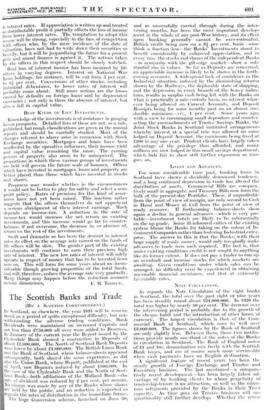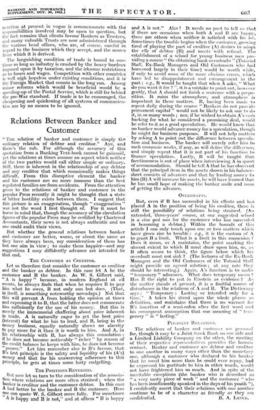As regards the Note Circulation of the eight banks in
Scotland, the total over the past eight or nine years has been steadily round about £21,000,000. In 1920 the total was higher by nearly 50 per cent. The decrease over the intervening period is probably due to the growth of the cheque habit and the introduction of other forms of currency. The largest circulation is that of the Com- mercial Bank of Scotland, which runs to well over 13,000,000. The figures shown by the Bank of Scotland are only slightly less. Between them, those two institu- tions provide nearly one-third of the notes of the Banks in circulation in Scotland. The Bank of England notes of £1 and 10s. denomination mix freely with the Scottish Bank issues, and arc of course much more serviceable when cash payments have an English destination. A significant feature of recent years has been the steady growth of Foreign Exchange and Trustee and Executory business. The last mentioned—a compara- tively recent development—has been largely taken ad- vantage of by banking clients to whom perpetuity of trusteeship-tenure is an attraction, as well as the nume- rous safeguards provided by the Banks in their Trust capacity. As time goes on Trustee business will un- questionably still further develop. Whether the reniu- aeration at present in vogue is commensurate with the responsibilities involved may be open to question, but the fact remains that clients favour Bankers as Trustees; and many valifable Trusts are now administered through the various head offices, who are, of course, careful in regard to the business which they accept, and the source from which it is derived.
The languishing condition of trade is bound to con.-- tinue so long as industry is crushed by the heavy burdens. imposed upon it by taxation, and the irksome restrictions. as to hours and wages. Competition with other countries: is well nigh hopeless under existing conditions, and it is the Foreign Market that counts in-the long run. Among. minor reforms which would be beneficial would be a speeding-up of the Postal Service, which is still far behind. the pre-War standard. If trade is to be encouraged, the cheapening and quickening of all systems of communica- tion are by no means to be ignored.













































 Previous page
Previous page